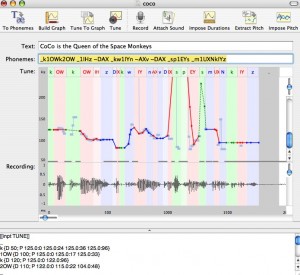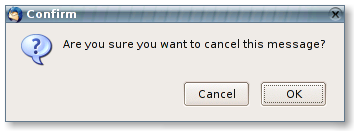Some time ago, Kevin Marks told me about a strange little OS X application that comes with Apple Macs. It is called “Speak After Me”, and takes a bit of text, records the user speaking the text, cuts it up (the speech, not the user) into phonemes — at least that’s what the program calls them — and then maps a pitch contour to the transcription.
Here is a screenshot of Kevin saying “Coco is the queen of the space monkeys” (click on the image to enlarge). Highlighted in yellow is the transcription it generates, using a very odd phonemic (phonetic?) notation:

Not having a Mac, I don’t know if the program works for other languages than English. But even in English, it is clear that its phoneme inventory must be a weak point of the system: Written language to phoneme mapping just doesn’t work across all varieties of English. On the other hand, you apparently can edit the speech recording/transcription/pitch contour set, and the program also lets you export the data as a plain text file. It might be nice to play around with for a class of advanced ESL learners, or even in native-language education at the high school or post-secondary level.
According to Kevin, this is mainly a OS X demo application and part of the “developers’ install”, which is accessible to all Mac OS X users. Does anyone know more about it?
Related posts: Pseudo-phonetics, Quick links, Branding: IPA and exotism, Multi-lang II, Merriam-Webster & Firefox, Pas aussi atroce que ça !, Transcribing an unknown language
Technorati (tags): language, langue, OS X, outils, phonétique, phonetics, tools



